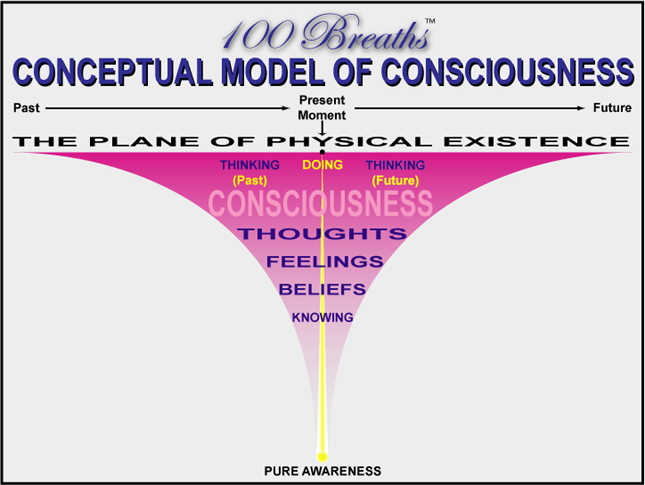
Truth is not something that you can search outside, it is something that needs to be explored within. Truth descends when you are in the state of no-mind. Being meditative leads into the state of no-mind. - Vishwas Chavan
What is Meditation
The 100 Breaths Definition...
A directed state of mind that focuses attention on specific prescribed thoughts that free the mind's awareness, release mental and physical stress, remove limitations and rehabilitate creative power.
A directed state of mindmeans that the practitioner intentionally and deliberately restricts the mind from thought and focuses on basic awareness using a prescribed focal point. By focusing in this way, we quickly discover an entire realm of mental activity that chatters away continuously in our consciousness and subconscious mind. Generally, we are processing multiple thoughts in parallel (simultaneously). We have more awareness of some thoughts and less awareness of others. We are unaware of this mental activity in our ordinary consciousness because it occurs at a slightly unconscious level.
During meditation, you will discover the many layers of thoughts that occupy your consciousness and those that bubble up from your subconscious. Once we discover the unproductive background noise that persists continuously in our minds, we can temporarily erase the distractions and find peaceful relaxation. We slow down our minds and create
spacewithin the mind to develop deeper awareness. This helps the mind to rest and the physical body to relax. This peaceful state of mind begins to persist beyond meditation sessions with regular practice. Over time, we notice subtle yet profound changes occurring in our life. While difficult to articulate, these benefits are very real to even the novice meditator.
It is impossible to conceptualize what goes on during meditation without a discussion of the mind and consciousness. The problem with this is that it's hard to define or even describe the mind in concrete terms. There are two diverse viewpoints on what the mind is. At one extreme, we have the functionalist view that the mind is defined entirely by underlying neurological activity and, more specifically, by human brain function. The scientific community supports this view, and plenty of research supports this position. There are continuous new discoveries unlocking the mysteries of the brain, giving us more insight into how it controls our thoughts, feelings, and emotions.
On the other extreme is the expanded view that says that the mind is separate from the body and survives the body. The expanded view tends to be supported by Theologists and spiritualists and has various ramifications regarding life, death, and what makes us human.
For the purposes of the 100 Breaths Meditation System, it is not necessary to have an absolute understanding of what the mind is or is not. In fact, all that is required is to have a conceptual understanding of the mind so that we may learn and practice the techniques. To gain conceptual understanding, we use the conceptual model below to describe the mind as consciousness.

Think of the mind as the sum total of your consciousness. All thinking resides within the consciousness. Although we live only in the present moment and progress physically through time, our consciousness resides simultaneously in the past, present, and future. There are also different levels of consciousness. On the surface, we are more aware of our thinking. As we go deeper into consciousness and down into subconscious levels, our awareness of thinking is diminished, but the thoughts' power persists. These subconscious thoughts take the form of feelings, emotions, and beliefs.
Our core identity is best defined as pure awareness. The problem is that our awareness is largely occluded, filtered, or altered by thoughts, feelings, emotions, and beliefs that encompass and shield our pure awareness within our broader consciousness. Within broader consciousness, our thoughts emerge within a temporal continuum that includes remembering the past and planning the future. Thoughts, feelings, emotions, and beliefs color how we experience life. On the other hand, pure awareness is absent of thought and lives only in the present moment!
Eckhart Tolle has written extensively about living in the present moment as pure awareness. I highly recommend his books, including The Power on Now, Stillness Speaks, and A New Earth. Meditation is a tool that will assist you in living the life espoused by Tolle.
So your core identity is simply the aspect of YOU that is pure awareness. Your mind is the broader consciousness that contains your awareness and the various thoughts that control how you experience your life. Awareness is ideally fed by your 5 (or 6) senses, but thoughts generally filter the sensory stimuli. Awareness can perceive and know. Unfortunately, we can't always access
In meditation, plain and simple, we learn to shut down thought mechanisms and get in touch with our Pure Awareness. Doing this on a regular basis helps us get the incessant thinking under control and reveals numerous benefits.
Our core identity is best defined as pure awareness. The problem is that our awareness is largely occluded, filtered, or altered by thoughts, feelings, emotions, and beliefs that encompass and shield our pure awareness within our broader consciousness. Within broader consciousness, our thoughts emerge within a temporal continuum that includes remembering the past and planning the future. Thoughts, feelings, emotions, and beliefs color how we experience life. On the other hand, pure awareness is absent of thought and lives only in the present moment!
Eckhart Tolle has written extensively about living in the present moment as pure awareness. I highly recommend his books, including The Power on Now, Stillness Speaks, and A New Earth. Meditation is a tool that will assist you in living the life espoused by Tolle.
So your core identity is simply the aspect of YOU that is pure awareness. Your mind is the broader consciousness that contains your awareness and the various thoughts that control how you experience your life. Awareness is ideally fed by your 5 (or 6) senses, but thoughts generally filter the sensory stimuli. Awareness can perceive and know. Unfortunately, we can't always access
Knowing,and we don't always
Perceivebecause our thoughts get in the way. The purest state of awareness is Knowing without thinking or perceiving without thinking. Knowing and perceiving does not require thought.
In meditation, plain and simple, we learn to shut down thought mechanisms and get in touch with our Pure Awareness. Doing this on a regular basis helps us get the incessant thinking under control and reveals numerous benefits.